Ethical Dilemmas in Business: Firestone Case Study Analysis Report
VerifiedAdded on 2023/01/04
|19
|5506
|24
Report
AI Summary
This report provides a detailed analysis of the ethical dilemmas presented in the Firestone case study. The report examines various ethical issues, including legal factors such as data breaches, intellectual property theft, and concealing information. It also explores professional issues like information security, leadership style, appropriating data, inappropriate behavior, cloning a business, unappreciative attitudes, unfair work opportunities, inaction, dishonesty, and lack of fairness. Furthermore, the analysis considers personal factors such as retribution, personal relationships, and hiding information, as well as intrinsic factors like childhood experiences. The report prioritizes these ethical issues, discusses them using relevant ethical theories, and concludes with learning outcomes related to technology ethics, the ethical technologist, habits of effective technologists, the ACS Code of Professional Conduct, ethical issues of the information age, thinking machines, the common denominator, and AI and human potential. The report aims to provide a comprehensive understanding of the ethical challenges faced in the case study and highlight important considerations for ethical conduct in professional settings.

1
Assignment Part 2: Analyzing Ethical Dilemmas
Student Name
Student Code
Subject Name
Subject Code
Assignment Part 2: Analyzing Ethical Dilemmas
Student Name
Student Code
Subject Name
Subject Code
Paraphrase This Document
Need a fresh take? Get an instant paraphrase of this document with our AI Paraphraser
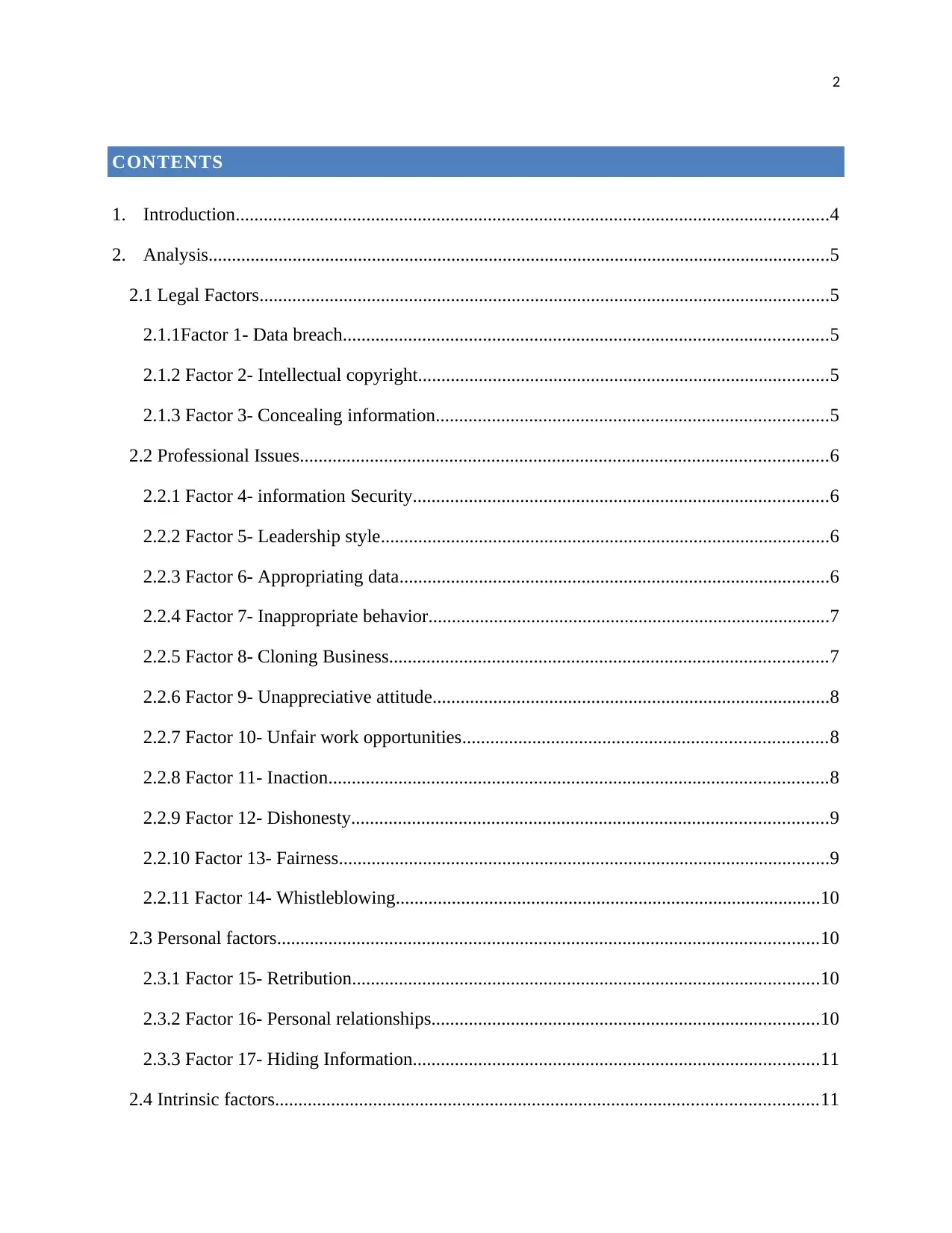
2
CONTENTS
1. Introduction...............................................................................................................................4
2. Analysis.....................................................................................................................................5
2.1 Legal Factors..........................................................................................................................5
2.1.1Factor 1- Data breach........................................................................................................5
2.1.2 Factor 2- Intellectual copyright........................................................................................5
2.1.3 Factor 3- Concealing information....................................................................................5
2.2 Professional Issues.................................................................................................................6
2.2.1 Factor 4- information Security.........................................................................................6
2.2.2 Factor 5- Leadership style................................................................................................6
2.2.3 Factor 6- Appropriating data............................................................................................6
2.2.4 Factor 7- Inappropriate behavior......................................................................................7
2.2.5 Factor 8- Cloning Business..............................................................................................7
2.2.6 Factor 9- Unappreciative attitude.....................................................................................8
2.2.7 Factor 10- Unfair work opportunities..............................................................................8
2.2.8 Factor 11- Inaction...........................................................................................................8
2.2.9 Factor 12- Dishonesty......................................................................................................9
2.2.10 Factor 13- Fairness.........................................................................................................9
2.2.11 Factor 14- Whistleblowing...........................................................................................10
2.3 Personal factors....................................................................................................................10
2.3.1 Factor 15- Retribution....................................................................................................10
2.3.2 Factor 16- Personal relationships...................................................................................10
2.3.3 Factor 17- Hiding Information.......................................................................................11
2.4 Intrinsic factors....................................................................................................................11
CONTENTS
1. Introduction...............................................................................................................................4
2. Analysis.....................................................................................................................................5
2.1 Legal Factors..........................................................................................................................5
2.1.1Factor 1- Data breach........................................................................................................5
2.1.2 Factor 2- Intellectual copyright........................................................................................5
2.1.3 Factor 3- Concealing information....................................................................................5
2.2 Professional Issues.................................................................................................................6
2.2.1 Factor 4- information Security.........................................................................................6
2.2.2 Factor 5- Leadership style................................................................................................6
2.2.3 Factor 6- Appropriating data............................................................................................6
2.2.4 Factor 7- Inappropriate behavior......................................................................................7
2.2.5 Factor 8- Cloning Business..............................................................................................7
2.2.6 Factor 9- Unappreciative attitude.....................................................................................8
2.2.7 Factor 10- Unfair work opportunities..............................................................................8
2.2.8 Factor 11- Inaction...........................................................................................................8
2.2.9 Factor 12- Dishonesty......................................................................................................9
2.2.10 Factor 13- Fairness.........................................................................................................9
2.2.11 Factor 14- Whistleblowing...........................................................................................10
2.3 Personal factors....................................................................................................................10
2.3.1 Factor 15- Retribution....................................................................................................10
2.3.2 Factor 16- Personal relationships...................................................................................10
2.3.3 Factor 17- Hiding Information.......................................................................................11
2.4 Intrinsic factors....................................................................................................................11
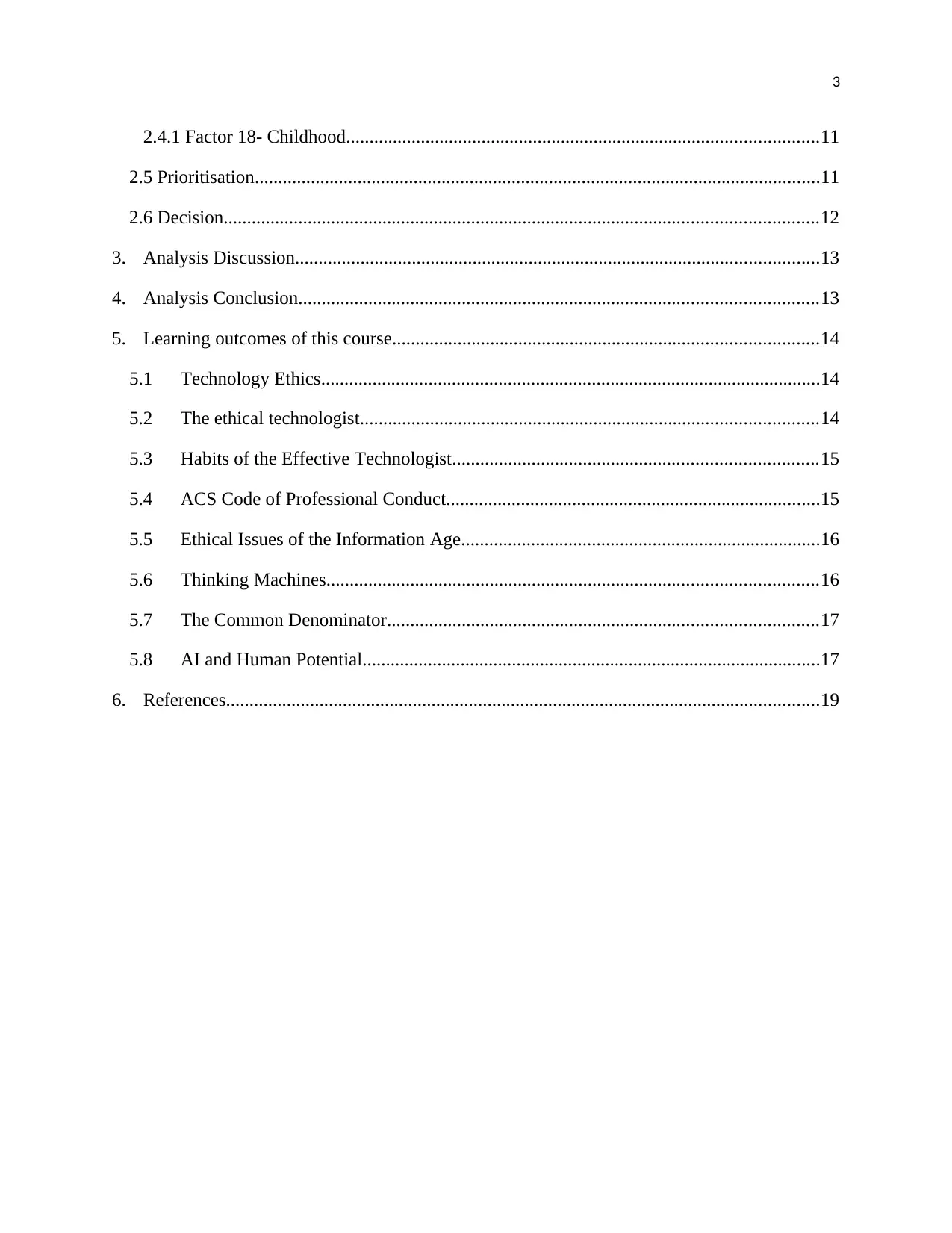
3
2.4.1 Factor 18- Childhood.....................................................................................................11
2.5 Prioritisation.........................................................................................................................11
2.6 Decision...............................................................................................................................12
3. Analysis Discussion................................................................................................................13
4. Analysis Conclusion...............................................................................................................13
5. Learning outcomes of this course...........................................................................................14
5.1 Technology Ethics...........................................................................................................14
5.2 The ethical technologist..................................................................................................14
5.3 Habits of the Effective Technologist..............................................................................15
5.4 ACS Code of Professional Conduct................................................................................15
5.5 Ethical Issues of the Information Age.............................................................................16
5.6 Thinking Machines.........................................................................................................16
5.7 The Common Denominator............................................................................................17
5.8 AI and Human Potential..................................................................................................17
6. References...............................................................................................................................19
2.4.1 Factor 18- Childhood.....................................................................................................11
2.5 Prioritisation.........................................................................................................................11
2.6 Decision...............................................................................................................................12
3. Analysis Discussion................................................................................................................13
4. Analysis Conclusion...............................................................................................................13
5. Learning outcomes of this course...........................................................................................14
5.1 Technology Ethics...........................................................................................................14
5.2 The ethical technologist..................................................................................................14
5.3 Habits of the Effective Technologist..............................................................................15
5.4 ACS Code of Professional Conduct................................................................................15
5.5 Ethical Issues of the Information Age.............................................................................16
5.6 Thinking Machines.........................................................................................................16
5.7 The Common Denominator............................................................................................17
5.8 AI and Human Potential..................................................................................................17
6. References...............................................................................................................................19
⊘ This is a preview!⊘
Do you want full access?
Subscribe today to unlock all pages.

Trusted by 1+ million students worldwide
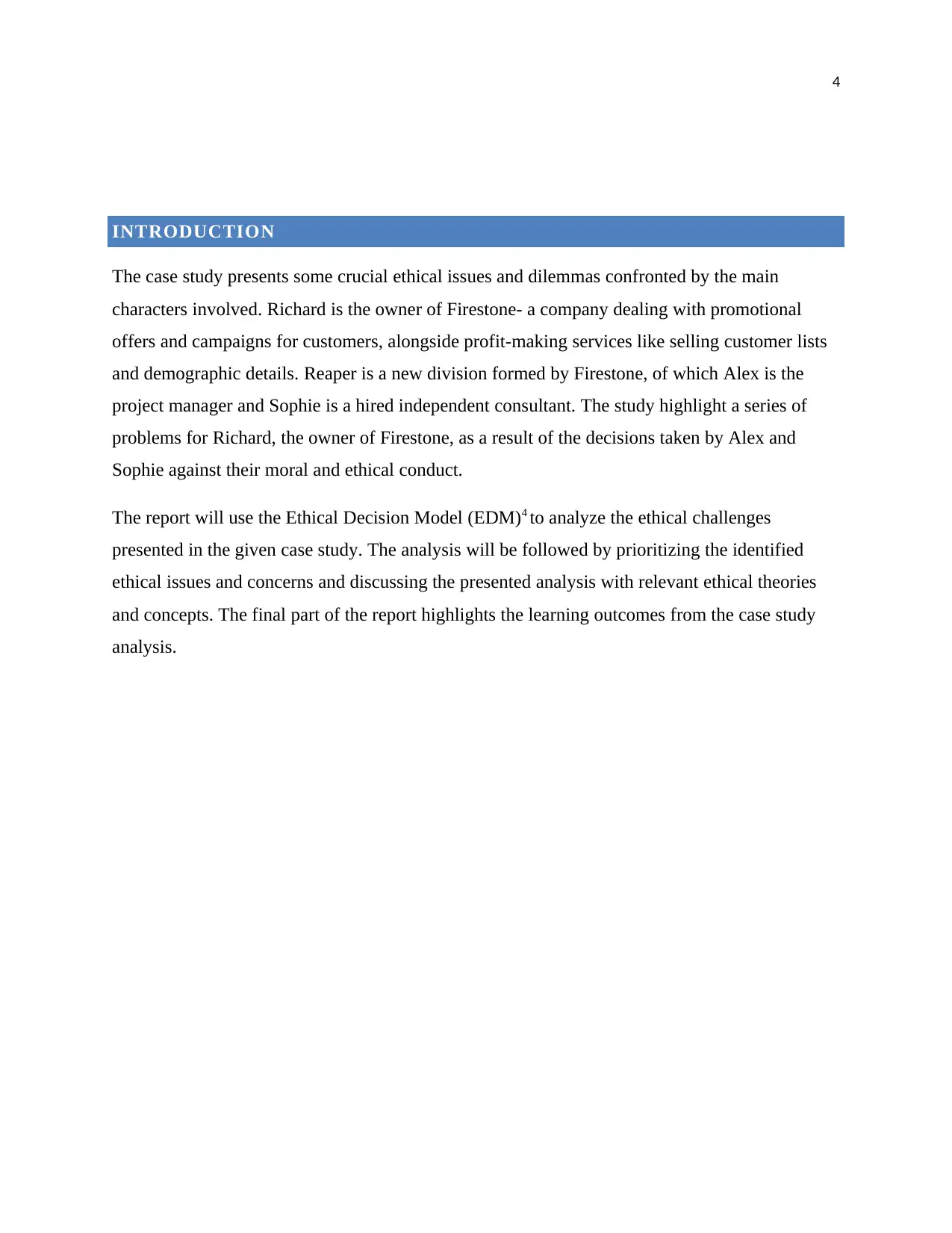
4
INTRODUCTION
The case study presents some crucial ethical issues and dilemmas confronted by the main
characters involved. Richard is the owner of Firestone- a company dealing with promotional
offers and campaigns for customers, alongside profit-making services like selling customer lists
and demographic details. Reaper is a new division formed by Firestone, of which Alex is the
project manager and Sophie is a hired independent consultant. The study highlight a series of
problems for Richard, the owner of Firestone, as a result of the decisions taken by Alex and
Sophie against their moral and ethical conduct.
The report will use the Ethical Decision Model (EDM)4 to analyze the ethical challenges
presented in the given case study. The analysis will be followed by prioritizing the identified
ethical issues and concerns and discussing the presented analysis with relevant ethical theories
and concepts. The final part of the report highlights the learning outcomes from the case study
analysis.
INTRODUCTION
The case study presents some crucial ethical issues and dilemmas confronted by the main
characters involved. Richard is the owner of Firestone- a company dealing with promotional
offers and campaigns for customers, alongside profit-making services like selling customer lists
and demographic details. Reaper is a new division formed by Firestone, of which Alex is the
project manager and Sophie is a hired independent consultant. The study highlight a series of
problems for Richard, the owner of Firestone, as a result of the decisions taken by Alex and
Sophie against their moral and ethical conduct.
The report will use the Ethical Decision Model (EDM)4 to analyze the ethical challenges
presented in the given case study. The analysis will be followed by prioritizing the identified
ethical issues and concerns and discussing the presented analysis with relevant ethical theories
and concepts. The final part of the report highlights the learning outcomes from the case study
analysis.
Paraphrase This Document
Need a fresh take? Get an instant paraphrase of this document with our AI Paraphraser
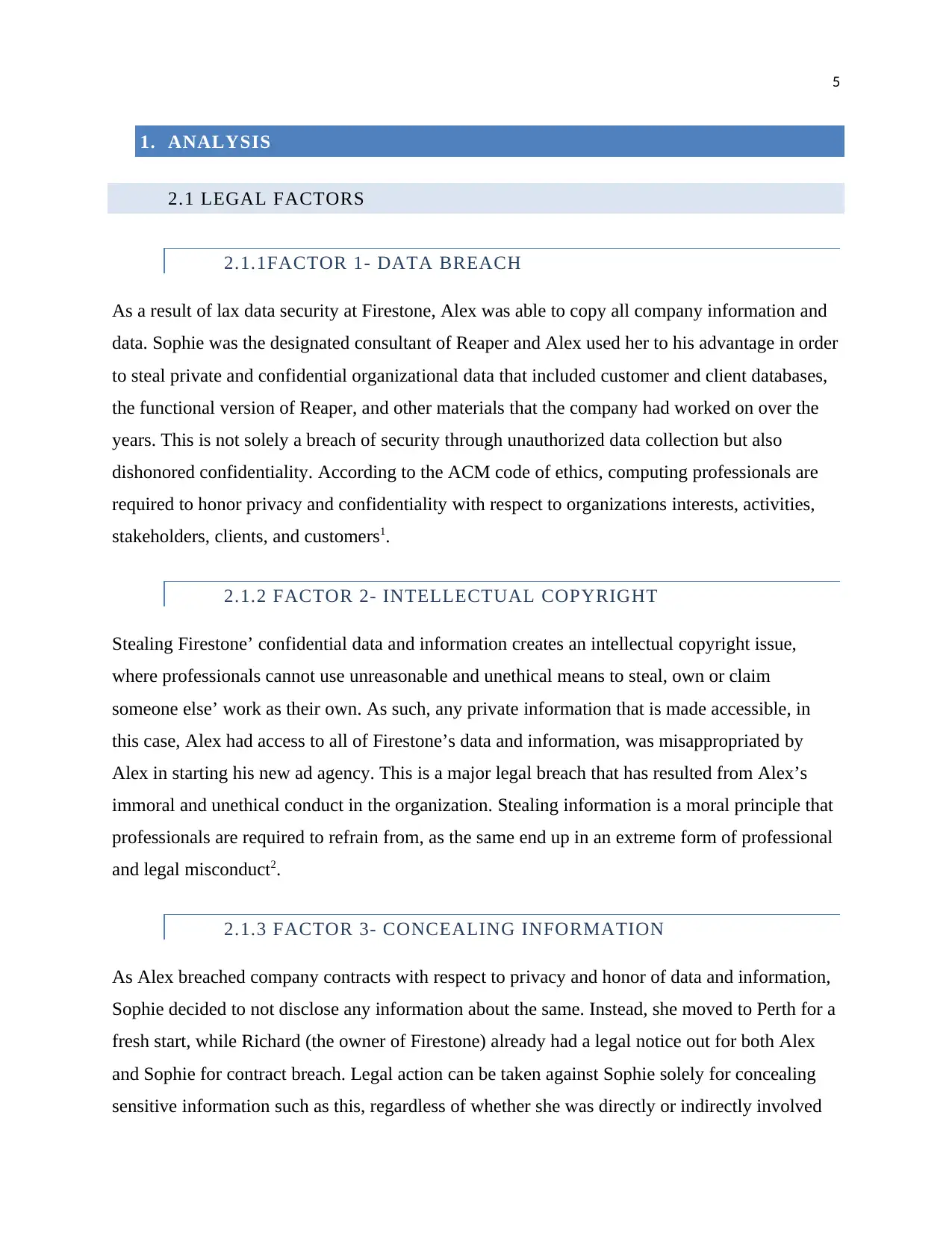
5
1. ANALYSIS
2.1 LEGAL FACTORS
2.1.1FACTOR 1- DATA BREACH
As a result of lax data security at Firestone, Alex was able to copy all company information and
data. Sophie was the designated consultant of Reaper and Alex used her to his advantage in order
to steal private and confidential organizational data that included customer and client databases,
the functional version of Reaper, and other materials that the company had worked on over the
years. This is not solely a breach of security through unauthorized data collection but also
dishonored confidentiality. According to the ACM code of ethics, computing professionals are
required to honor privacy and confidentiality with respect to organizations interests, activities,
stakeholders, clients, and customers1.
2.1.2 FACTOR 2- INTELLECTUAL COPYRIGHT
Stealing Firestone’ confidential data and information creates an intellectual copyright issue,
where professionals cannot use unreasonable and unethical means to steal, own or claim
someone else’ work as their own. As such, any private information that is made accessible, in
this case, Alex had access to all of Firestone’s data and information, was misappropriated by
Alex in starting his new ad agency. This is a major legal breach that has resulted from Alex’s
immoral and unethical conduct in the organization. Stealing information is a moral principle that
professionals are required to refrain from, as the same end up in an extreme form of professional
and legal misconduct2.
2.1.3 FACTOR 3- CONCEALING INFORMATION
As Alex breached company contracts with respect to privacy and honor of data and information,
Sophie decided to not disclose any information about the same. Instead, she moved to Perth for a
fresh start, while Richard (the owner of Firestone) already had a legal notice out for both Alex
and Sophie for contract breach. Legal action can be taken against Sophie solely for concealing
sensitive information such as this, regardless of whether she was directly or indirectly involved
1. ANALYSIS
2.1 LEGAL FACTORS
2.1.1FACTOR 1- DATA BREACH
As a result of lax data security at Firestone, Alex was able to copy all company information and
data. Sophie was the designated consultant of Reaper and Alex used her to his advantage in order
to steal private and confidential organizational data that included customer and client databases,
the functional version of Reaper, and other materials that the company had worked on over the
years. This is not solely a breach of security through unauthorized data collection but also
dishonored confidentiality. According to the ACM code of ethics, computing professionals are
required to honor privacy and confidentiality with respect to organizations interests, activities,
stakeholders, clients, and customers1.
2.1.2 FACTOR 2- INTELLECTUAL COPYRIGHT
Stealing Firestone’ confidential data and information creates an intellectual copyright issue,
where professionals cannot use unreasonable and unethical means to steal, own or claim
someone else’ work as their own. As such, any private information that is made accessible, in
this case, Alex had access to all of Firestone’s data and information, was misappropriated by
Alex in starting his new ad agency. This is a major legal breach that has resulted from Alex’s
immoral and unethical conduct in the organization. Stealing information is a moral principle that
professionals are required to refrain from, as the same end up in an extreme form of professional
and legal misconduct2.
2.1.3 FACTOR 3- CONCEALING INFORMATION
As Alex breached company contracts with respect to privacy and honor of data and information,
Sophie decided to not disclose any information about the same. Instead, she moved to Perth for a
fresh start, while Richard (the owner of Firestone) already had a legal notice out for both Alex
and Sophie for contract breach. Legal action can be taken against Sophie solely for concealing
sensitive information such as this, regardless of whether she was directly or indirectly involved
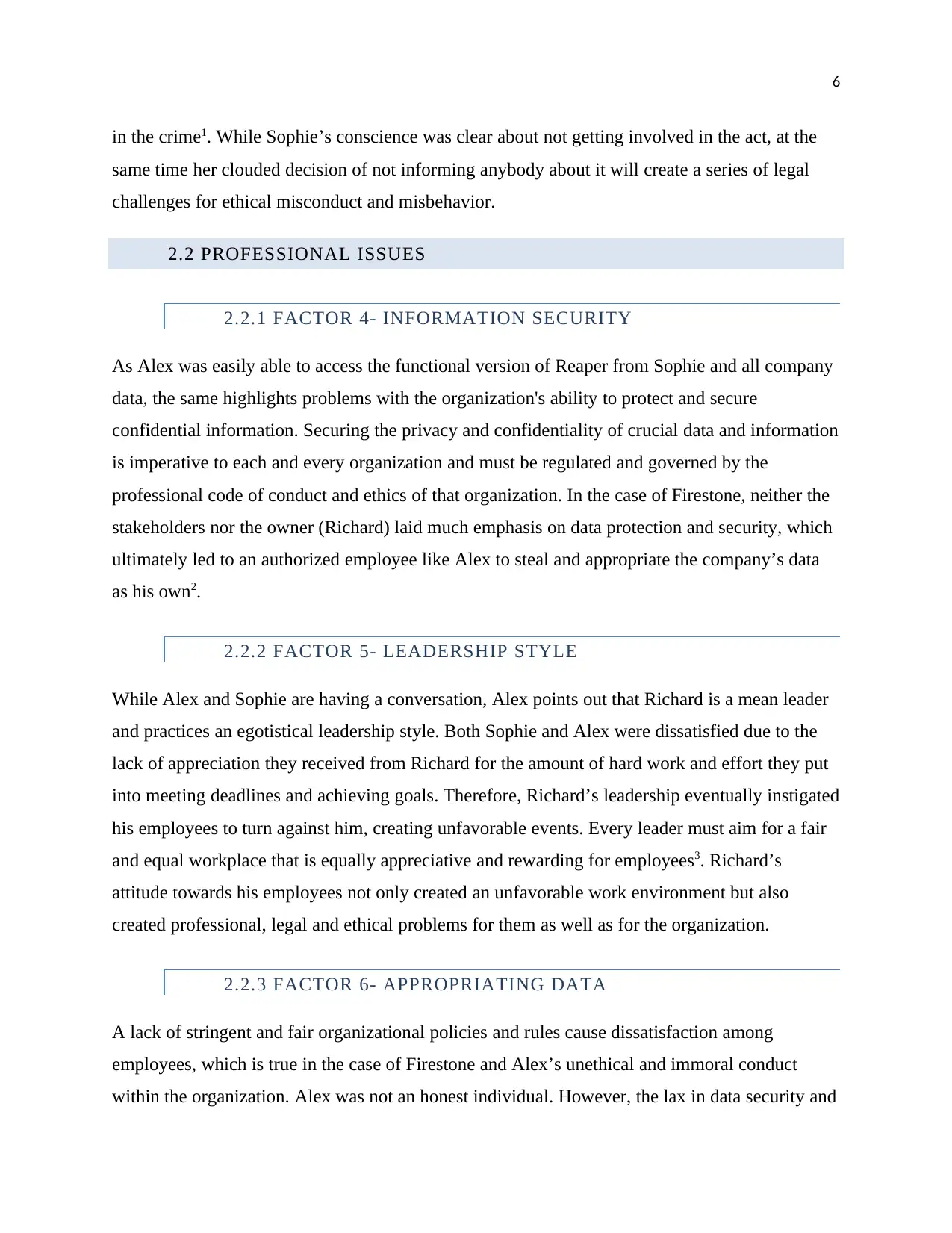
6
in the crime1. While Sophie’s conscience was clear about not getting involved in the act, at the
same time her clouded decision of not informing anybody about it will create a series of legal
challenges for ethical misconduct and misbehavior.
2.2 PROFESSIONAL ISSUES
2.2.1 FACTOR 4- INFORMATION SECURITY
As Alex was easily able to access the functional version of Reaper from Sophie and all company
data, the same highlights problems with the organization's ability to protect and secure
confidential information. Securing the privacy and confidentiality of crucial data and information
is imperative to each and every organization and must be regulated and governed by the
professional code of conduct and ethics of that organization. In the case of Firestone, neither the
stakeholders nor the owner (Richard) laid much emphasis on data protection and security, which
ultimately led to an authorized employee like Alex to steal and appropriate the company’s data
as his own2.
2.2.2 FACTOR 5- LEADERSHIP STYLE
While Alex and Sophie are having a conversation, Alex points out that Richard is a mean leader
and practices an egotistical leadership style. Both Sophie and Alex were dissatisfied due to the
lack of appreciation they received from Richard for the amount of hard work and effort they put
into meeting deadlines and achieving goals. Therefore, Richard’s leadership eventually instigated
his employees to turn against him, creating unfavorable events. Every leader must aim for a fair
and equal workplace that is equally appreciative and rewarding for employees3. Richard’s
attitude towards his employees not only created an unfavorable work environment but also
created professional, legal and ethical problems for them as well as for the organization.
2.2.3 FACTOR 6- APPROPRIATING DATA
A lack of stringent and fair organizational policies and rules cause dissatisfaction among
employees, which is true in the case of Firestone and Alex’s unethical and immoral conduct
within the organization. Alex was not an honest individual. However, the lax in data security and
in the crime1. While Sophie’s conscience was clear about not getting involved in the act, at the
same time her clouded decision of not informing anybody about it will create a series of legal
challenges for ethical misconduct and misbehavior.
2.2 PROFESSIONAL ISSUES
2.2.1 FACTOR 4- INFORMATION SECURITY
As Alex was easily able to access the functional version of Reaper from Sophie and all company
data, the same highlights problems with the organization's ability to protect and secure
confidential information. Securing the privacy and confidentiality of crucial data and information
is imperative to each and every organization and must be regulated and governed by the
professional code of conduct and ethics of that organization. In the case of Firestone, neither the
stakeholders nor the owner (Richard) laid much emphasis on data protection and security, which
ultimately led to an authorized employee like Alex to steal and appropriate the company’s data
as his own2.
2.2.2 FACTOR 5- LEADERSHIP STYLE
While Alex and Sophie are having a conversation, Alex points out that Richard is a mean leader
and practices an egotistical leadership style. Both Sophie and Alex were dissatisfied due to the
lack of appreciation they received from Richard for the amount of hard work and effort they put
into meeting deadlines and achieving goals. Therefore, Richard’s leadership eventually instigated
his employees to turn against him, creating unfavorable events. Every leader must aim for a fair
and equal workplace that is equally appreciative and rewarding for employees3. Richard’s
attitude towards his employees not only created an unfavorable work environment but also
created professional, legal and ethical problems for them as well as for the organization.
2.2.3 FACTOR 6- APPROPRIATING DATA
A lack of stringent and fair organizational policies and rules cause dissatisfaction among
employees, which is true in the case of Firestone and Alex’s unethical and immoral conduct
within the organization. Alex was not an honest individual. However, the lax in data security and
⊘ This is a preview!⊘
Do you want full access?
Subscribe today to unlock all pages.

Trusted by 1+ million students worldwide
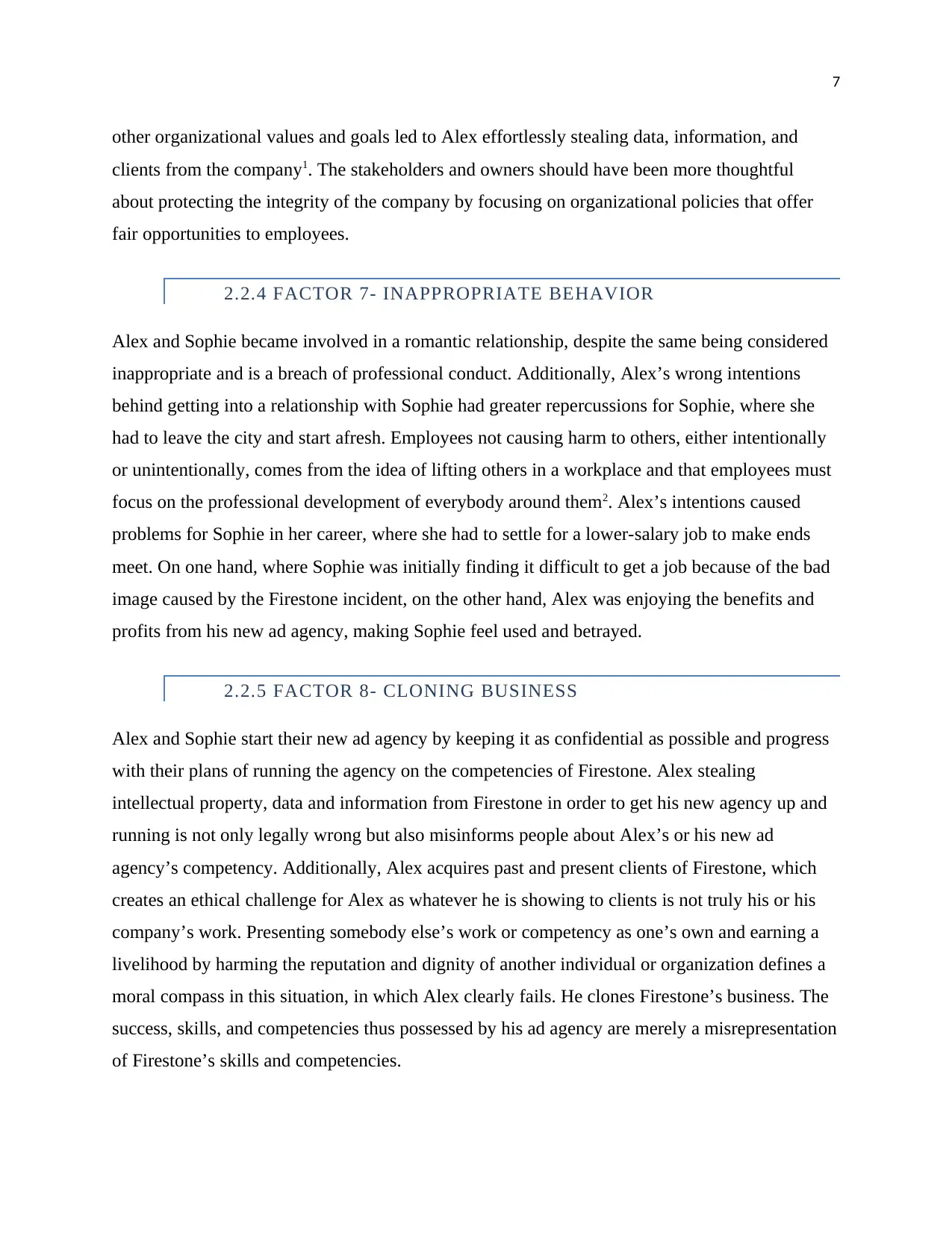
7
other organizational values and goals led to Alex effortlessly stealing data, information, and
clients from the company1. The stakeholders and owners should have been more thoughtful
about protecting the integrity of the company by focusing on organizational policies that offer
fair opportunities to employees.
2.2.4 FACTOR 7- INAPPROPRIATE BEHAVIOR
Alex and Sophie became involved in a romantic relationship, despite the same being considered
inappropriate and is a breach of professional conduct. Additionally, Alex’s wrong intentions
behind getting into a relationship with Sophie had greater repercussions for Sophie, where she
had to leave the city and start afresh. Employees not causing harm to others, either intentionally
or unintentionally, comes from the idea of lifting others in a workplace and that employees must
focus on the professional development of everybody around them2. Alex’s intentions caused
problems for Sophie in her career, where she had to settle for a lower-salary job to make ends
meet. On one hand, where Sophie was initially finding it difficult to get a job because of the bad
image caused by the Firestone incident, on the other hand, Alex was enjoying the benefits and
profits from his new ad agency, making Sophie feel used and betrayed.
2.2.5 FACTOR 8- CLONING BUSINESS
Alex and Sophie start their new ad agency by keeping it as confidential as possible and progress
with their plans of running the agency on the competencies of Firestone. Alex stealing
intellectual property, data and information from Firestone in order to get his new agency up and
running is not only legally wrong but also misinforms people about Alex’s or his new ad
agency’s competency. Additionally, Alex acquires past and present clients of Firestone, which
creates an ethical challenge for Alex as whatever he is showing to clients is not truly his or his
company’s work. Presenting somebody else’s work or competency as one’s own and earning a
livelihood by harming the reputation and dignity of another individual or organization defines a
moral compass in this situation, in which Alex clearly fails. He clones Firestone’s business. The
success, skills, and competencies thus possessed by his ad agency are merely a misrepresentation
of Firestone’s skills and competencies.
other organizational values and goals led to Alex effortlessly stealing data, information, and
clients from the company1. The stakeholders and owners should have been more thoughtful
about protecting the integrity of the company by focusing on organizational policies that offer
fair opportunities to employees.
2.2.4 FACTOR 7- INAPPROPRIATE BEHAVIOR
Alex and Sophie became involved in a romantic relationship, despite the same being considered
inappropriate and is a breach of professional conduct. Additionally, Alex’s wrong intentions
behind getting into a relationship with Sophie had greater repercussions for Sophie, where she
had to leave the city and start afresh. Employees not causing harm to others, either intentionally
or unintentionally, comes from the idea of lifting others in a workplace and that employees must
focus on the professional development of everybody around them2. Alex’s intentions caused
problems for Sophie in her career, where she had to settle for a lower-salary job to make ends
meet. On one hand, where Sophie was initially finding it difficult to get a job because of the bad
image caused by the Firestone incident, on the other hand, Alex was enjoying the benefits and
profits from his new ad agency, making Sophie feel used and betrayed.
2.2.5 FACTOR 8- CLONING BUSINESS
Alex and Sophie start their new ad agency by keeping it as confidential as possible and progress
with their plans of running the agency on the competencies of Firestone. Alex stealing
intellectual property, data and information from Firestone in order to get his new agency up and
running is not only legally wrong but also misinforms people about Alex’s or his new ad
agency’s competency. Additionally, Alex acquires past and present clients of Firestone, which
creates an ethical challenge for Alex as whatever he is showing to clients is not truly his or his
company’s work. Presenting somebody else’s work or competency as one’s own and earning a
livelihood by harming the reputation and dignity of another individual or organization defines a
moral compass in this situation, in which Alex clearly fails. He clones Firestone’s business. The
success, skills, and competencies thus possessed by his ad agency are merely a misrepresentation
of Firestone’s skills and competencies.
Paraphrase This Document
Need a fresh take? Get an instant paraphrase of this document with our AI Paraphraser
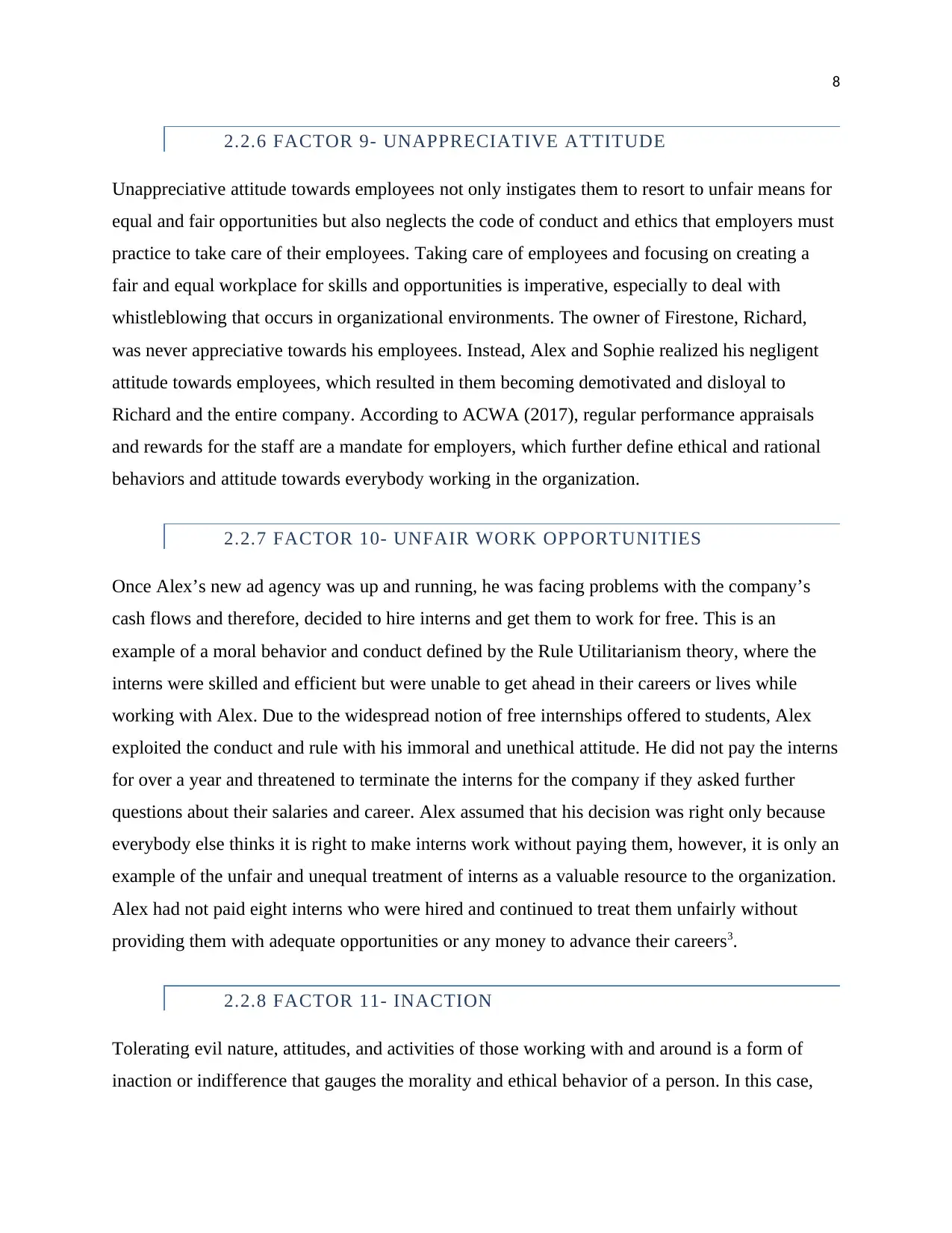
8
2.2.6 FACTOR 9- UNAPPRECIATIVE ATTITUDE
Unappreciative attitude towards employees not only instigates them to resort to unfair means for
equal and fair opportunities but also neglects the code of conduct and ethics that employers must
practice to take care of their employees. Taking care of employees and focusing on creating a
fair and equal workplace for skills and opportunities is imperative, especially to deal with
whistleblowing that occurs in organizational environments. The owner of Firestone, Richard,
was never appreciative towards his employees. Instead, Alex and Sophie realized his negligent
attitude towards employees, which resulted in them becoming demotivated and disloyal to
Richard and the entire company. According to ACWA (2017), regular performance appraisals
and rewards for the staff are a mandate for employers, which further define ethical and rational
behaviors and attitude towards everybody working in the organization.
2.2.7 FACTOR 10- UNFAIR WORK OPPORTUNITIES
Once Alex’s new ad agency was up and running, he was facing problems with the company’s
cash flows and therefore, decided to hire interns and get them to work for free. This is an
example of a moral behavior and conduct defined by the Rule Utilitarianism theory, where the
interns were skilled and efficient but were unable to get ahead in their careers or lives while
working with Alex. Due to the widespread notion of free internships offered to students, Alex
exploited the conduct and rule with his immoral and unethical attitude. He did not pay the interns
for over a year and threatened to terminate the interns for the company if they asked further
questions about their salaries and career. Alex assumed that his decision was right only because
everybody else thinks it is right to make interns work without paying them, however, it is only an
example of the unfair and unequal treatment of interns as a valuable resource to the organization.
Alex had not paid eight interns who were hired and continued to treat them unfairly without
providing them with adequate opportunities or any money to advance their careers3.
2.2.8 FACTOR 11- INACTION
Tolerating evil nature, attitudes, and activities of those working with and around is a form of
inaction or indifference that gauges the morality and ethical behavior of a person. In this case,
2.2.6 FACTOR 9- UNAPPRECIATIVE ATTITUDE
Unappreciative attitude towards employees not only instigates them to resort to unfair means for
equal and fair opportunities but also neglects the code of conduct and ethics that employers must
practice to take care of their employees. Taking care of employees and focusing on creating a
fair and equal workplace for skills and opportunities is imperative, especially to deal with
whistleblowing that occurs in organizational environments. The owner of Firestone, Richard,
was never appreciative towards his employees. Instead, Alex and Sophie realized his negligent
attitude towards employees, which resulted in them becoming demotivated and disloyal to
Richard and the entire company. According to ACWA (2017), regular performance appraisals
and rewards for the staff are a mandate for employers, which further define ethical and rational
behaviors and attitude towards everybody working in the organization.
2.2.7 FACTOR 10- UNFAIR WORK OPPORTUNITIES
Once Alex’s new ad agency was up and running, he was facing problems with the company’s
cash flows and therefore, decided to hire interns and get them to work for free. This is an
example of a moral behavior and conduct defined by the Rule Utilitarianism theory, where the
interns were skilled and efficient but were unable to get ahead in their careers or lives while
working with Alex. Due to the widespread notion of free internships offered to students, Alex
exploited the conduct and rule with his immoral and unethical attitude. He did not pay the interns
for over a year and threatened to terminate the interns for the company if they asked further
questions about their salaries and career. Alex assumed that his decision was right only because
everybody else thinks it is right to make interns work without paying them, however, it is only an
example of the unfair and unequal treatment of interns as a valuable resource to the organization.
Alex had not paid eight interns who were hired and continued to treat them unfairly without
providing them with adequate opportunities or any money to advance their careers3.
2.2.8 FACTOR 11- INACTION
Tolerating evil nature, attitudes, and activities of those working with and around is a form of
inaction or indifference that gauges the morality and ethical behavior of a person. In this case,
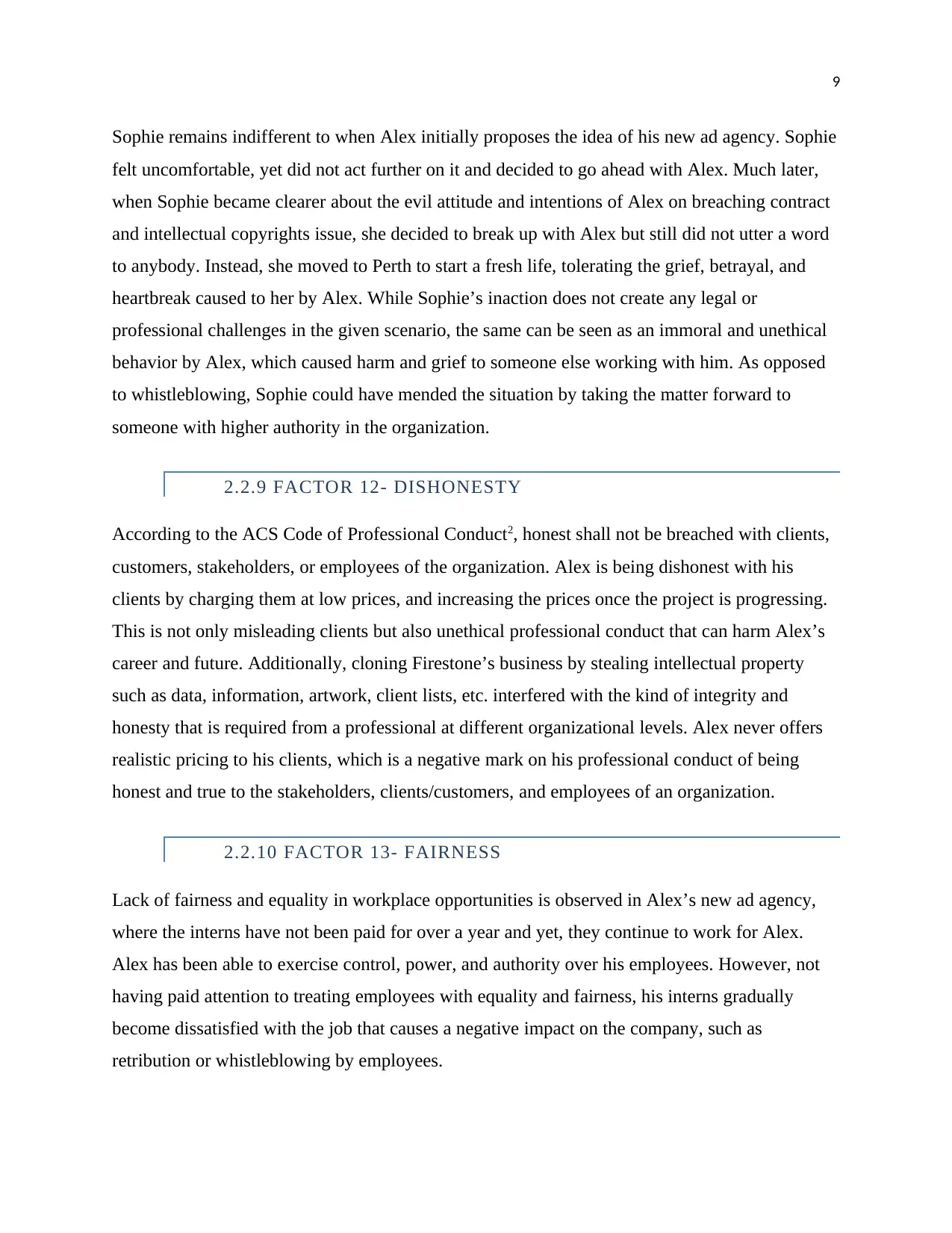
9
Sophie remains indifferent to when Alex initially proposes the idea of his new ad agency. Sophie
felt uncomfortable, yet did not act further on it and decided to go ahead with Alex. Much later,
when Sophie became clearer about the evil attitude and intentions of Alex on breaching contract
and intellectual copyrights issue, she decided to break up with Alex but still did not utter a word
to anybody. Instead, she moved to Perth to start a fresh life, tolerating the grief, betrayal, and
heartbreak caused to her by Alex. While Sophie’s inaction does not create any legal or
professional challenges in the given scenario, the same can be seen as an immoral and unethical
behavior by Alex, which caused harm and grief to someone else working with him. As opposed
to whistleblowing, Sophie could have mended the situation by taking the matter forward to
someone with higher authority in the organization.
2.2.9 FACTOR 12- DISHONESTY
According to the ACS Code of Professional Conduct2, honest shall not be breached with clients,
customers, stakeholders, or employees of the organization. Alex is being dishonest with his
clients by charging them at low prices, and increasing the prices once the project is progressing.
This is not only misleading clients but also unethical professional conduct that can harm Alex’s
career and future. Additionally, cloning Firestone’s business by stealing intellectual property
such as data, information, artwork, client lists, etc. interfered with the kind of integrity and
honesty that is required from a professional at different organizational levels. Alex never offers
realistic pricing to his clients, which is a negative mark on his professional conduct of being
honest and true to the stakeholders, clients/customers, and employees of an organization.
2.2.10 FACTOR 13- FAIRNESS
Lack of fairness and equality in workplace opportunities is observed in Alex’s new ad agency,
where the interns have not been paid for over a year and yet, they continue to work for Alex.
Alex has been able to exercise control, power, and authority over his employees. However, not
having paid attention to treating employees with equality and fairness, his interns gradually
become dissatisfied with the job that causes a negative impact on the company, such as
retribution or whistleblowing by employees.
Sophie remains indifferent to when Alex initially proposes the idea of his new ad agency. Sophie
felt uncomfortable, yet did not act further on it and decided to go ahead with Alex. Much later,
when Sophie became clearer about the evil attitude and intentions of Alex on breaching contract
and intellectual copyrights issue, she decided to break up with Alex but still did not utter a word
to anybody. Instead, she moved to Perth to start a fresh life, tolerating the grief, betrayal, and
heartbreak caused to her by Alex. While Sophie’s inaction does not create any legal or
professional challenges in the given scenario, the same can be seen as an immoral and unethical
behavior by Alex, which caused harm and grief to someone else working with him. As opposed
to whistleblowing, Sophie could have mended the situation by taking the matter forward to
someone with higher authority in the organization.
2.2.9 FACTOR 12- DISHONESTY
According to the ACS Code of Professional Conduct2, honest shall not be breached with clients,
customers, stakeholders, or employees of the organization. Alex is being dishonest with his
clients by charging them at low prices, and increasing the prices once the project is progressing.
This is not only misleading clients but also unethical professional conduct that can harm Alex’s
career and future. Additionally, cloning Firestone’s business by stealing intellectual property
such as data, information, artwork, client lists, etc. interfered with the kind of integrity and
honesty that is required from a professional at different organizational levels. Alex never offers
realistic pricing to his clients, which is a negative mark on his professional conduct of being
honest and true to the stakeholders, clients/customers, and employees of an organization.
2.2.10 FACTOR 13- FAIRNESS
Lack of fairness and equality in workplace opportunities is observed in Alex’s new ad agency,
where the interns have not been paid for over a year and yet, they continue to work for Alex.
Alex has been able to exercise control, power, and authority over his employees. However, not
having paid attention to treating employees with equality and fairness, his interns gradually
become dissatisfied with the job that causes a negative impact on the company, such as
retribution or whistleblowing by employees.
⊘ This is a preview!⊘
Do you want full access?
Subscribe today to unlock all pages.

Trusted by 1+ million students worldwide
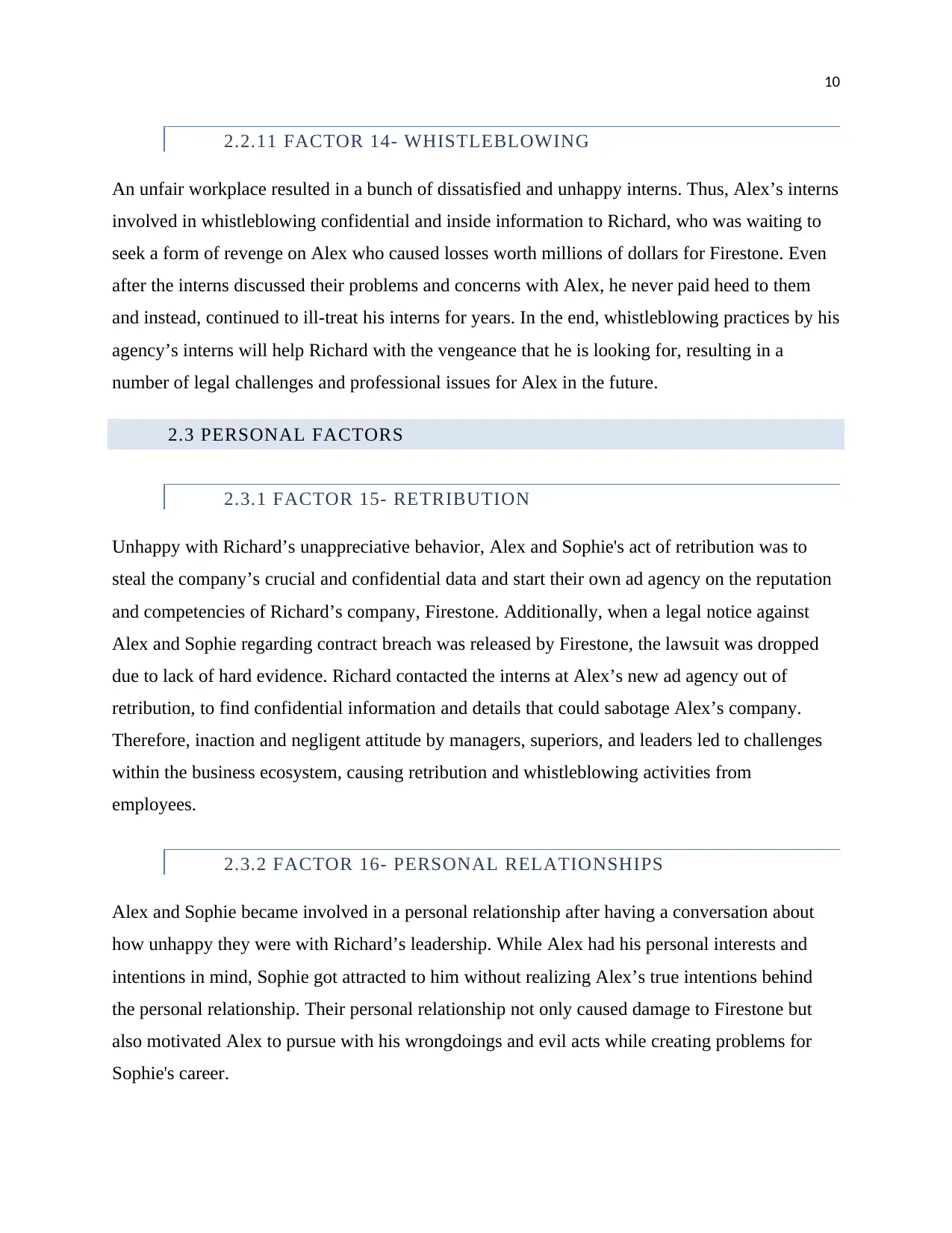
10
2.2.11 FACTOR 14- WHISTLEBLOWING
An unfair workplace resulted in a bunch of dissatisfied and unhappy interns. Thus, Alex’s interns
involved in whistleblowing confidential and inside information to Richard, who was waiting to
seek a form of revenge on Alex who caused losses worth millions of dollars for Firestone. Even
after the interns discussed their problems and concerns with Alex, he never paid heed to them
and instead, continued to ill-treat his interns for years. In the end, whistleblowing practices by his
agency’s interns will help Richard with the vengeance that he is looking for, resulting in a
number of legal challenges and professional issues for Alex in the future.
2.3 PERSONAL FACTORS
2.3.1 FACTOR 15- RETRIBUTION
Unhappy with Richard’s unappreciative behavior, Alex and Sophie's act of retribution was to
steal the company’s crucial and confidential data and start their own ad agency on the reputation
and competencies of Richard’s company, Firestone. Additionally, when a legal notice against
Alex and Sophie regarding contract breach was released by Firestone, the lawsuit was dropped
due to lack of hard evidence. Richard contacted the interns at Alex’s new ad agency out of
retribution, to find confidential information and details that could sabotage Alex’s company.
Therefore, inaction and negligent attitude by managers, superiors, and leaders led to challenges
within the business ecosystem, causing retribution and whistleblowing activities from
employees.
2.3.2 FACTOR 16- PERSONAL RELATIONSHIPS
Alex and Sophie became involved in a personal relationship after having a conversation about
how unhappy they were with Richard’s leadership. While Alex had his personal interests and
intentions in mind, Sophie got attracted to him without realizing Alex’s true intentions behind
the personal relationship. Their personal relationship not only caused damage to Firestone but
also motivated Alex to pursue with his wrongdoings and evil acts while creating problems for
Sophie's career.
2.2.11 FACTOR 14- WHISTLEBLOWING
An unfair workplace resulted in a bunch of dissatisfied and unhappy interns. Thus, Alex’s interns
involved in whistleblowing confidential and inside information to Richard, who was waiting to
seek a form of revenge on Alex who caused losses worth millions of dollars for Firestone. Even
after the interns discussed their problems and concerns with Alex, he never paid heed to them
and instead, continued to ill-treat his interns for years. In the end, whistleblowing practices by his
agency’s interns will help Richard with the vengeance that he is looking for, resulting in a
number of legal challenges and professional issues for Alex in the future.
2.3 PERSONAL FACTORS
2.3.1 FACTOR 15- RETRIBUTION
Unhappy with Richard’s unappreciative behavior, Alex and Sophie's act of retribution was to
steal the company’s crucial and confidential data and start their own ad agency on the reputation
and competencies of Richard’s company, Firestone. Additionally, when a legal notice against
Alex and Sophie regarding contract breach was released by Firestone, the lawsuit was dropped
due to lack of hard evidence. Richard contacted the interns at Alex’s new ad agency out of
retribution, to find confidential information and details that could sabotage Alex’s company.
Therefore, inaction and negligent attitude by managers, superiors, and leaders led to challenges
within the business ecosystem, causing retribution and whistleblowing activities from
employees.
2.3.2 FACTOR 16- PERSONAL RELATIONSHIPS
Alex and Sophie became involved in a personal relationship after having a conversation about
how unhappy they were with Richard’s leadership. While Alex had his personal interests and
intentions in mind, Sophie got attracted to him without realizing Alex’s true intentions behind
the personal relationship. Their personal relationship not only caused damage to Firestone but
also motivated Alex to pursue with his wrongdoings and evil acts while creating problems for
Sophie's career.
Paraphrase This Document
Need a fresh take? Get an instant paraphrase of this document with our AI Paraphraser
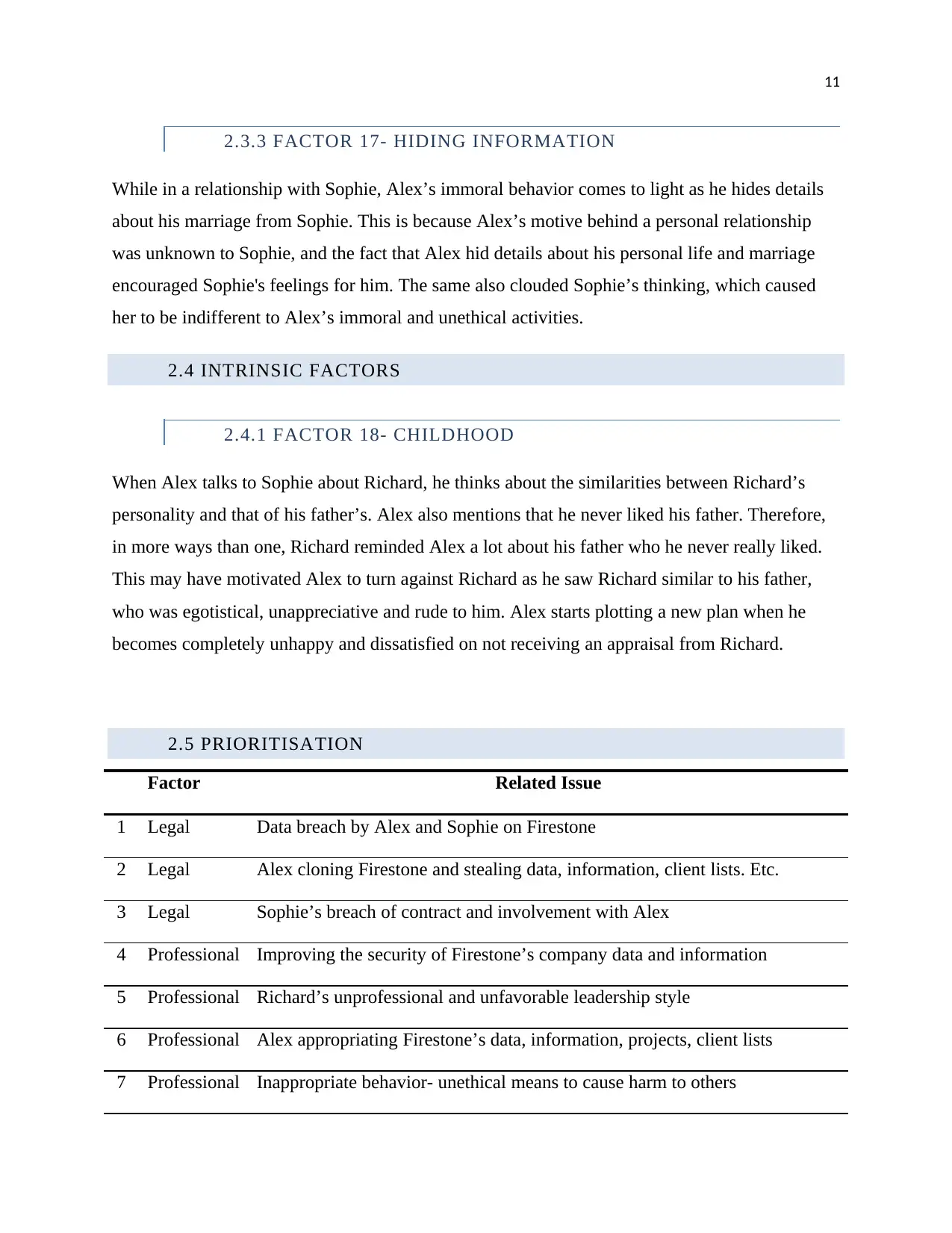
11
2.3.3 FACTOR 17- HIDING INFORMATION
While in a relationship with Sophie, Alex’s immoral behavior comes to light as he hides details
about his marriage from Sophie. This is because Alex’s motive behind a personal relationship
was unknown to Sophie, and the fact that Alex hid details about his personal life and marriage
encouraged Sophie's feelings for him. The same also clouded Sophie’s thinking, which caused
her to be indifferent to Alex’s immoral and unethical activities.
2.4 INTRINSIC FACTORS
2.4.1 FACTOR 18- CHILDHOOD
When Alex talks to Sophie about Richard, he thinks about the similarities between Richard’s
personality and that of his father’s. Alex also mentions that he never liked his father. Therefore,
in more ways than one, Richard reminded Alex a lot about his father who he never really liked.
This may have motivated Alex to turn against Richard as he saw Richard similar to his father,
who was egotistical, unappreciative and rude to him. Alex starts plotting a new plan when he
becomes completely unhappy and dissatisfied on not receiving an appraisal from Richard.
2.5 PRIORITISATION
Factor Related Issue
1 Legal Data breach by Alex and Sophie on Firestone
2 Legal Alex cloning Firestone and stealing data, information, client lists. Etc.
3 Legal Sophie’s breach of contract and involvement with Alex
4 Professional Improving the security of Firestone’s company data and information
5 Professional Richard’s unprofessional and unfavorable leadership style
6 Professional Alex appropriating Firestone’s data, information, projects, client lists
7 Professional Inappropriate behavior- unethical means to cause harm to others
2.3.3 FACTOR 17- HIDING INFORMATION
While in a relationship with Sophie, Alex’s immoral behavior comes to light as he hides details
about his marriage from Sophie. This is because Alex’s motive behind a personal relationship
was unknown to Sophie, and the fact that Alex hid details about his personal life and marriage
encouraged Sophie's feelings for him. The same also clouded Sophie’s thinking, which caused
her to be indifferent to Alex’s immoral and unethical activities.
2.4 INTRINSIC FACTORS
2.4.1 FACTOR 18- CHILDHOOD
When Alex talks to Sophie about Richard, he thinks about the similarities between Richard’s
personality and that of his father’s. Alex also mentions that he never liked his father. Therefore,
in more ways than one, Richard reminded Alex a lot about his father who he never really liked.
This may have motivated Alex to turn against Richard as he saw Richard similar to his father,
who was egotistical, unappreciative and rude to him. Alex starts plotting a new plan when he
becomes completely unhappy and dissatisfied on not receiving an appraisal from Richard.
2.5 PRIORITISATION
Factor Related Issue
1 Legal Data breach by Alex and Sophie on Firestone
2 Legal Alex cloning Firestone and stealing data, information, client lists. Etc.
3 Legal Sophie’s breach of contract and involvement with Alex
4 Professional Improving the security of Firestone’s company data and information
5 Professional Richard’s unprofessional and unfavorable leadership style
6 Professional Alex appropriating Firestone’s data, information, projects, client lists
7 Professional Inappropriate behavior- unethical means to cause harm to others
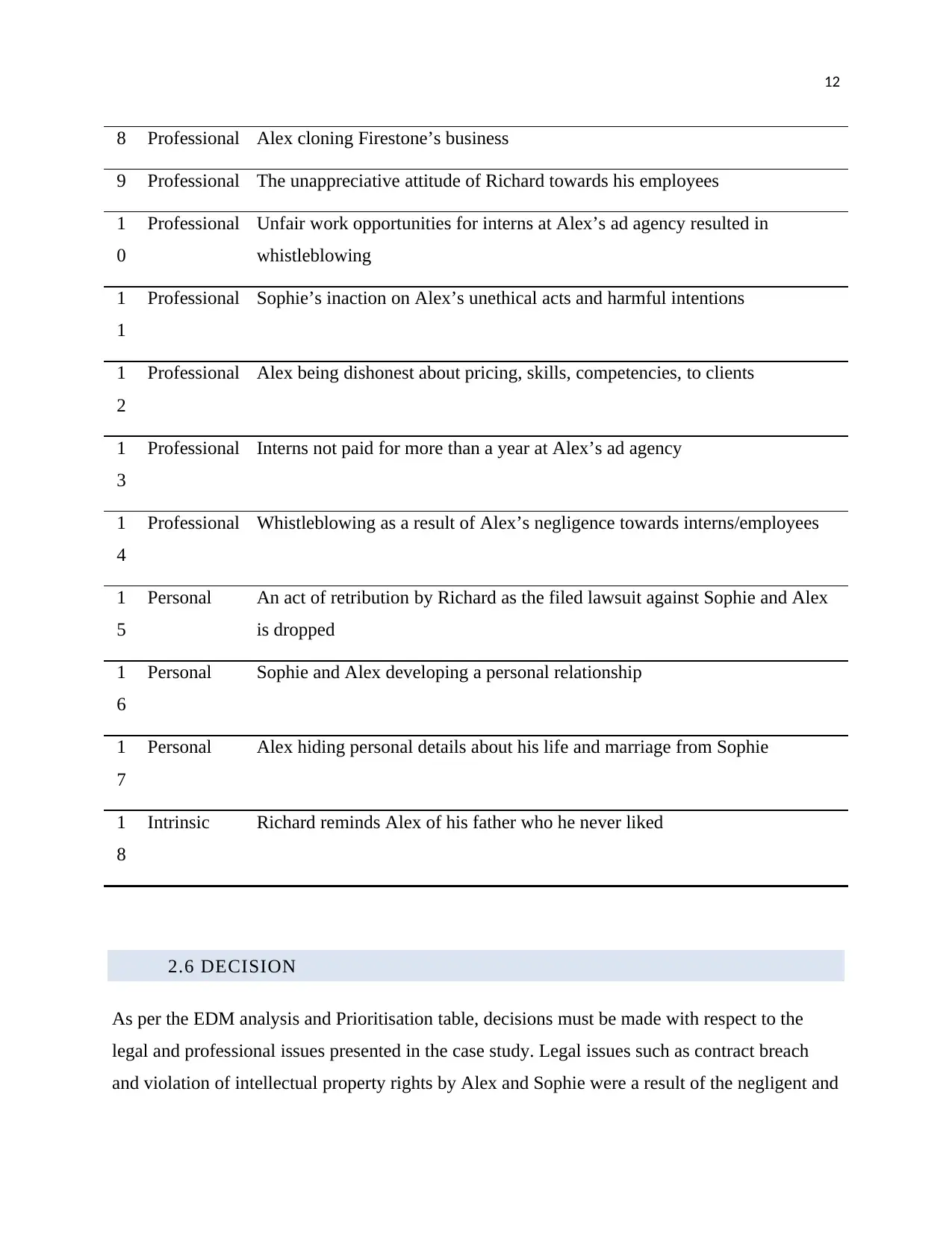
12
8 Professional Alex cloning Firestone’s business
9 Professional The unappreciative attitude of Richard towards his employees
1
0
Professional Unfair work opportunities for interns at Alex’s ad agency resulted in
whistleblowing
1
1
Professional Sophie’s inaction on Alex’s unethical acts and harmful intentions
1
2
Professional Alex being dishonest about pricing, skills, competencies, to clients
1
3
Professional Interns not paid for more than a year at Alex’s ad agency
1
4
Professional Whistleblowing as a result of Alex’s negligence towards interns/employees
1
5
Personal An act of retribution by Richard as the filed lawsuit against Sophie and Alex
is dropped
1
6
Personal Sophie and Alex developing a personal relationship
1
7
Personal Alex hiding personal details about his life and marriage from Sophie
1
8
Intrinsic Richard reminds Alex of his father who he never liked
2.6 DECISION
As per the EDM analysis and Prioritisation table, decisions must be made with respect to the
legal and professional issues presented in the case study. Legal issues such as contract breach
and violation of intellectual property rights by Alex and Sophie were a result of the negligent and
8 Professional Alex cloning Firestone’s business
9 Professional The unappreciative attitude of Richard towards his employees
1
0
Professional Unfair work opportunities for interns at Alex’s ad agency resulted in
whistleblowing
1
1
Professional Sophie’s inaction on Alex’s unethical acts and harmful intentions
1
2
Professional Alex being dishonest about pricing, skills, competencies, to clients
1
3
Professional Interns not paid for more than a year at Alex’s ad agency
1
4
Professional Whistleblowing as a result of Alex’s negligence towards interns/employees
1
5
Personal An act of retribution by Richard as the filed lawsuit against Sophie and Alex
is dropped
1
6
Personal Sophie and Alex developing a personal relationship
1
7
Personal Alex hiding personal details about his life and marriage from Sophie
1
8
Intrinsic Richard reminds Alex of his father who he never liked
2.6 DECISION
As per the EDM analysis and Prioritisation table, decisions must be made with respect to the
legal and professional issues presented in the case study. Legal issues such as contract breach
and violation of intellectual property rights by Alex and Sophie were a result of the negligent and
⊘ This is a preview!⊘
Do you want full access?
Subscribe today to unlock all pages.

Trusted by 1+ million students worldwide
1 out of 19
Related Documents
Your All-in-One AI-Powered Toolkit for Academic Success.
+13062052269
info@desklib.com
Available 24*7 on WhatsApp / Email
![[object Object]](/_next/static/media/star-bottom.7253800d.svg)
Unlock your academic potential
Copyright © 2020–2026 A2Z Services. All Rights Reserved. Developed and managed by ZUCOL.


